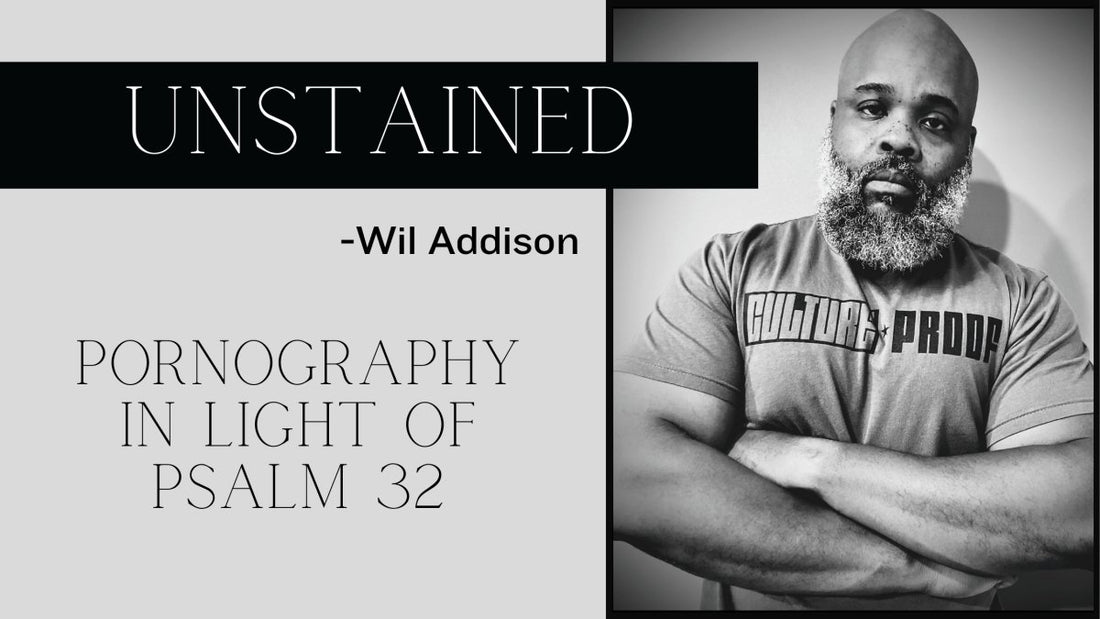The Bible does not describe explicitly the situation surrounding Psalm 32, but much wisdom and understanding can be gained in the application of acknowledging, confessing, repenting, and receiving forgiveness of sin and transgressions.
Considering the pervasiveness of pornography among both church leaders and members, Psalm 32:3-5 is a reminder and encouragement and great comfort for those entangled in the sin of pornography.
Psalm 32:1-2 starts with jubilant praise and recognition:
“How blessed is he whose transgression is forgiven, Whose sin is covered! How blessed is the man to whom the Lord does not impute or (ascribe) iniquity, And in whose spirit there is no deceit!”
David paints a picture of the freedom in having our transgressions forgiven and our sins covered. We see the joy of iniquity not imputed by the Lord and the freedom of not living under the scourge of deceit from living a double life. Whenever believers are entrenched in pornography, they are living a life of deceit. They present outwardly a pristine, clean veneer, but inwardly, what exists is a filthy, disgusting, and shameful vessel.
When transgressions are forgiven, a weight is lifted off of us because, as it states in Proverbs 13:15b, the way of the transgressor is hard. We no longer try to cover, excuse, or deny that we struggle or fall to our secret sin.
The covering takes place when we are humbled and do what David did in Psalm 32:3-5:
“When I kept silent about my sin, my body wasted away through my groaning all day long. For day and night Your hand was heavy upon me; My vitality was drained away with the fever heat of summer. Selah. I acknowledged my sin to You, And my iniquity I did not hide; I said, “I will confess my transgressions to the Lord; And You forgave the guilt of my sin.”
First, David admits that he kept silent about his sin for more than nine months. We do the same thing when we think that we don’t have to confess our sin to God. He already knows, right? Second, we do this same thing because of the shame of sin. We play ourselves by thinking if we can just keep it silent, then we will defeat these besetting sins, or they will just go away. Third, we deceive ourselves by thinking, “It's not that bad. At least I don’t do these other sins.” By doing so, we play right into the devil's hands.
Pornography grows and thrives in darkness. When we are silent before God and our family in Christ, we give sin all the fuel it needs to continue to grow.
Effects of Silent, Unconfessed Sin
David admitted he was physically affected by his sin and silence. Pornography afflicts its victims physically, mentally, and spiritually. The emotional trauma of carrying around sin can lead you into the darkness of depression, ineffectiveness, and mental slavery. Pornography is linked to depression, anxiety, and reduced cognitive function. Research also shows that pornography can alter brain plasticity and cause changes similar to those associated with long-term drug use. Keeping silent about pornographic sin affects the body, literally the wasting away of our brains. I remember feeling sick when I first began watching hardcore pornography. The crazy thing was that after the sickness passed and I went back to consuming pornography, the sick feeling was overridden and didn’t come back.
For the Christian, silence regarding unconfessed sin brings conviction. David said that day and night, God's hand was heavy upon him. This was because of David’s unconfessed, secret sin. As Christians, the conviction from the Holy Spirit is God’s mercy upon us to move us to repentance. Praise God if you are experiencing this conviction! It’s a sure indication that you are His. Don’t continue to the point where you override this conviction. That is a very dark and destructive place, leading to reprobation and the end of that is unrestraint and unfettered wickedness.
For the Christian, any unconfessed sin brings physical, mental, and spiritual weakness. David said, “My vitality was drained away as with the fever heat of summer. Selah." The literal heaviness of sin, the draining of vitality, and the exhaustion of carrying transgressions and sins materialize in these ways.
I remember being drained because my mind was always consumed with pornographic thoughts, battling those thoughts, and simultaneously being convicted by the Holy Spirit. The struggle repeatedly involved telling myself, “I’m never going to do this again. I’m not watching this stuff anymore.” Yet, within hours of making this grand confession, I was right back online, looking over my shoulder to ensure no one was coming into the room to expose me. The oppressive depression is like a cloud over your head. This saps your vitality! This bondage causes you to feel drained.
The good news is that it’s an oppression from which God can deliver us if we humble ourselves, confess and forsake our sins and transgressions, and allow God to sanctify us. We must be transparent before God first, then before man.
Sin vs. Transgression
David describes how to start living in victory over sins and transgressions. He says, “I acknowledged my sin to You, And my iniquity I did not hide;” In Psalm 51:4, David says, “Against You, You only, I have sinned And done what is evil in Your sight.” We have to realize that our primary offense is against a Holy God. David goes on, “I said, ‘I will confess my transgressions to the Lord.’”
What is the difference between a sin and a transgression in those verses? Sin is missing the mark. it’s missing the mark by not hitting the bullseye of God’s perfect standard. Sin definitely leads downward into more sin if we are not vigilant in confessing our sins before God, fully repenting, or turning away from those very sins.
Transgressions are a different thing. Transgression refers to intentionally disobeying, willfully crossing the line into knowing sin. Pornography fits squarely in this category. We allow for transgression in our lives. We make room for it and accommodate it, so it becomes what we do as our normal behavior. Then it twists into iniquity. The term poignantly describes the way sin skews truth into falsehood. We continue without even seeking repentance as we accept the lies.
We have to be like David. He reached a point after his sin turned from transgressions into iniquity that he finally acknowledged his sin to God. He said, “I will confess my transgressions to the Lord.” David was at the right point at last. He finally acknowledged and confessed his sins and transgressions. The beautiful part is verse 5: “And You forgave the guilt of my sin."
David did NOT write God "forgave my sin and transgressions," but he wrote, "And You forgave the guilt of my sin." Shame and guilt are associated with offending God. God is poised and ready to forgive so that we no longer have to bear the heavy weight we are carrying. All that David described in verses 3-4 was eradicated. The body wasting away, the groaning all day long, God’s heavy hand of conviction, the vitality drained as with the fever heat of summer were all done!
What David experienced was deliverance. We can experience this same deliverance, too, if we do what David did. Acknowledge the sin. Confess it to God, confess it to another believer in Christ, and be healed (James 5:16). You do not have to continually be weighed down by the repeating cycle of unconfessed sin. Hiding sin in our lives only gives it nourishment to grow. Let’s humble ourselves before God, be transparent with Him, and find true freedom in His forgiveness.

